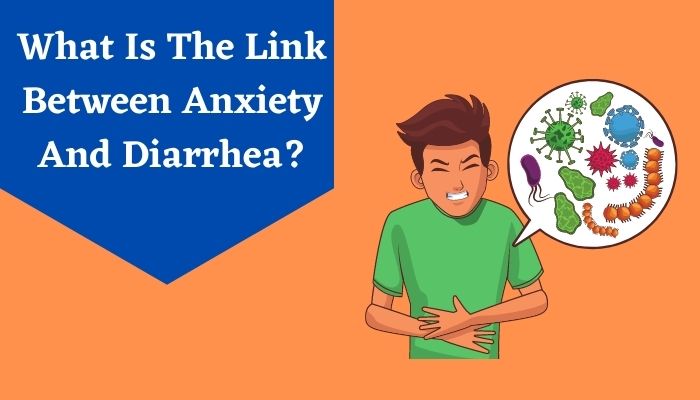Anxiety is a common mental disorder that produces a chunk of symptoms. This may also cause physical symptoms to some people. If you experience diarrhea under stressful conditions, then you may not be alone. Stomach upset is a common example of anxiety for many people. But you can manage this symptom and reduce its effect on your life.
Can Anxiety Cause Diarrhea?
Let’s unravel it.According to the Anxiety and Depression Association of America (ADAA), if a person is anxious or worried, then his body releases hormones and chemicals. These may enter the digestive tract of the person and disturb the gut flora. This can cause a chemical imbalance that may lead to diarrhea.
Is Diarrhea a Symptom of Anxiety?
Diarrhea and other digestive problems are the common symptoms of anxiety. This is because there is a connection between your brain and the gut system, often called the gut-brain axis.The axis links your central nervous system to your enteric nervous system (ENS) that may act as your gut’s nervous system. The ENS controls all the processes of the gastrointestinal (GI) tract. Due to its link to your brain, this can affect your emotions and behavior.
Under any stressful condition, chemical messengers usually carry signals from your brain to your gut. Your gut often responds to these signals with physical symptoms, like diarrhea, nausea, or constipation.
This link works vice-versa. This means, if you are suffering from diarrhea or other GI problems, you may experience psychological symptoms. Irritable Bowel Syndrome (IBS) or related conditions may enhance the risk of anxiety and other mood symptoms.
Also Read: A Guide to Treating Diarrhea through Home Remedies
Relationship of Anxiety-Diarrhea
Some people may experience diarrhea when they are stressed. Anxiety and stress may trigger your IBS. According to the experts, people who have IBS may also have an overly sensitive colon. This sensitivity enhances your chance of getting GI symptoms when you consume certain foods or experience anxiety or other emotional agonies.Many people have both anxiety and IBS. Several studies have claimed that IBS co-occurs with anxiety and depression. If you have any of these problems, it will automatically increase your risk for the other.
Common Symptoms of IBS
- Recurrent pain and discomfort in your abdomen
- Stomach cramps
- Increased gas
- Diarrhea, constipation, or alternating diarrhea and constipation
How Do You Manage Stress Diarrhea?
If you manage your anxiety symptoms, then this will improve your mental and physical symptoms. Initially, you should consult a mental health professional.A therapist will help you to find out the right treatment that will go with your needs. It could be a therapy or a combination of therapy and medication. Many people who have GI symptoms and anxiety or depression find that antidepressants are useful in coping with both symptoms. Sometimes, lifestyle changes will help you in managing the symptoms of anxiety.
Certain tips that will help you to manage your diarrhea and other stomach problems are:
- Avoid alcohol and tobacco
- Restrict your caffeine intake
- Always stay hydrated
- Eat a balanced diet that includes whole grains, lean protein, and fruits and vegetables
- Do regular exercise
Manage Stress to Control Anxiety Diarrhea
Chronic stress is responsible for serious health issues. There are plenty of ways to manage stress and build up pliability to the triggers that cause it. You can follow the below-mentioned ways to control your stress.1. Identifying Stress Triggering Factors: To control your stress, you need to identify the situations in which it occurs. Once you are able to recognize your stress triggers, you can easily find out ways to deal with them.
2. Exercise and Take Breaks to Reduce Stress Triggers: You can practice several exercises like deep breathing, yoga, walking, jogging, etc. to manage your stress. Take a temporary break from the stressor.
3. Nature Reduces Stress Level: Try to spend some time in nature to alleviate your stress level. Sometimes, taking a hot shower will also help you to stay relaxed and energized.
4. Maintaining a Healthful Lifestyle: Follow a healthy lifestyle by eating wholesome foods, exercising regularly, and sleeping (adequate time).
5. Avoid Toxic Addictions: Alcohol, tobacco, and other unwholesome substances may reduce the symptoms of stress temporarily, but they are more harmful in long-term use.
6. Seek Support from Family and Friends: If you are stressed or feeling mentally weak, try to open yourself up and speak to your friends or neighbors who will help you to overcome your situation. They might know how to deal with the situation and thus, will help you to overcome your stress and other mental problems.
When to Consult a Doctor?
You must consult a doctor for your stress diarrhea under the following conditions.- Symptoms are not improving or don’t go away after several weeks
- You get anxiety poop during the night
- You have bloody stools
- Irregular bowel movements
- Persistent pain or cramping
- Find difficulties in swallowing
- Abrupt weight loss
- Vomiting for no particular reason


